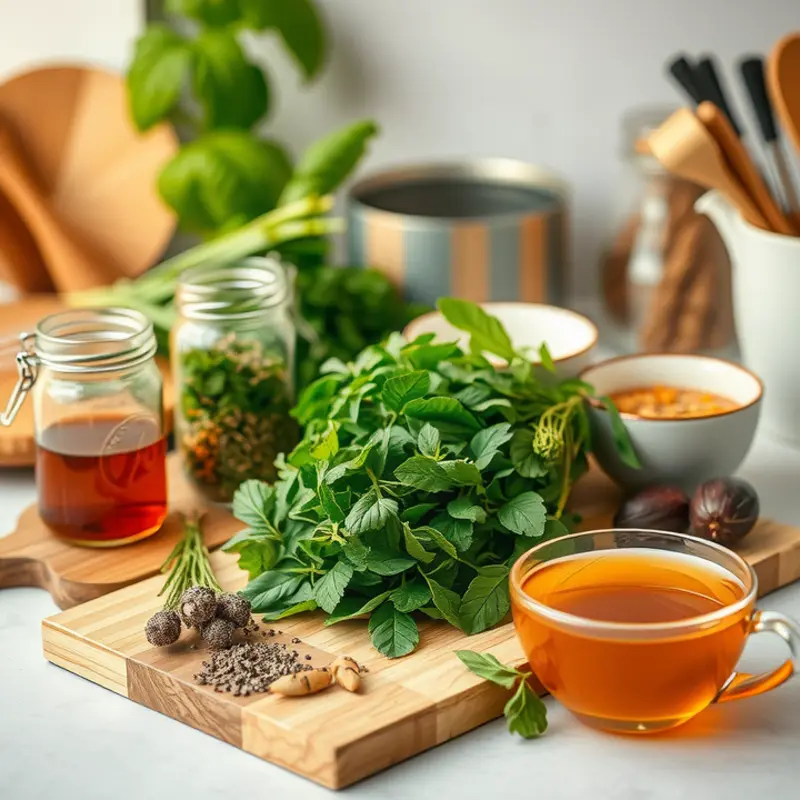Enhancing mental clarity is essential for maintaining focus and productivity in daily life. Natural herbs offer a wealth of benefits, supporting cognitive function and overall brain health without the need for synthetic supplements. By exploring the top herbs known for their cognitive-enhancing properties, you can easily integrate these functional foods into your routine, contributing to your overall wellness journey.
Nourishing the Mind: Key Herbs for Cognitive Enhancement

A quest for mental clarity often leads to nature’s storeroom, rich with herbs that herald cognitive health. Ginkgo biloba stands as a sentinel among these, celebrated for its capacity to bolster memory and focus. Extracts from this ancient tree enhance blood circulation in the brain, facilitating improved oxygen and nutrient delivery. Its antioxidant properties combat neural inflammation, potentially delaying cognitive decline. Experts suggest consuming 120 to 240 mg of Ginkgo biloba extract daily, taking care to choose standardized products to ensure efficacy.
Rosemary is another time-honored herb linked to memory improvement. Its aromatic properties alone can invigorate the mind; studies show simply inhaling rosemary can enhance prospective memory. This brain-boosting potential is attributed to its active compounds, such as 1,8-cineole, which may increase acetylcholine levels, a critical neurotransmitter for learning and memory. A sprinkle of fresh rosemary in a dish or a teaspoon of rosemary tea daily can be an easy way to reap its cognitive benefits.
Bacopa monnieri, revered in Ayurvedic medicine, shines in the realm of brain enhancement. Known for its ability to reduce anxiety and improve memory, Bacopa contains bacosides that support neuron communication and assist in neuron repair. This dual action fosters learning and memory retention. A dosage of 300 mg of Bacopa extract, standardized to contain 55% bacosides, is commonly recommended.
Integrating these herbs into your diet can be simple and flavorful. Consider creating an herbal elixir by brewing a mix of rosemary and Bacopa tea, a potent tonic for clarity. For a culinary twist, roasted vegetables seasoned with ginkgo and rosemary make a hearty, brain-boosting side dish. When consuming such herbs, always be mindful of potential interactions with medications.
For those aiming to explore more on enhancing their mental clarity through dietary choices, consider nutritional adequacy as a foundational element. It provides a broad understanding of how various essentials contribute to overall brain and body health.
By embracing these herbs thoughtfully, one can embark on a journey toward sharper cognition and a clearer mind. The potential of natural ingredients to nourish the brain is undeniable, offering a harmonious blend of science and tradition to support mental vitality.
Integrating Herbs into Daily Life for Lasting Benefits

Incorporating cognitive-enhancing herbs into your daily routine can unlock numerous benefits for your mental clarity. Whether you prefer sipping herb-infused teas or experimenting in the kitchen, there are many approachable ways to make these botanicals a staple in your diet.
One of the simplest ways to benefit from herbs is through tea. Ginkgo biloba, for instance, is renowned for its memory-enhancing properties. Steep ginkgo leaves in boiling water for 10 minutes to create a soothing beverage. To become more adventurous, try blending various herbs such as gotu kola and peppermint for a multi-faceted, cognitive boost. If mornings are hectic, consider preparing a large batch. Steep a blend in a glass pitcher and refrigerate it for an accessible, cold brew option that can be enjoyed throughout the week.
Culinary integration of herbs like rosemary and turmeric can amplify your meals with their unique flavors and brain-boosting benefits. Rosemary’s compounds, such as carnosic acid, support brain function, and can be easily added to roasted vegetables, soups, or even bread dough for a flavorful twist. Turmeric, known for its active compound curcumin, supports cognitive health and can be included in rice dishes, stews, or smoothies. Consider using black pepper alongside turmeric to enhance curcumin absorption.
When incorporating herbs into your meals, it is essential to consider dosage. For example, the recommended daily intake of ginkgo biloba is around 120 to 240 mg. It’s prudent to gradually introduce these herbs to your diet, monitoring your body’s reaction. Consulting with a healthcare provider before making significant changes is always wise.
In addition to these practical approaches, you can enhance your mindfulness around food. A more conscious approach can deepen your connection with these natural powerhouses. To explore mindful eating further, see addressing unconscious habits, which may improve your overall well-being.
Furthermore, herb-based supplements can be considered for those with limited time or who prefer a more straightforward regimen. With capsules and extracts, you can support mental function while accommodating a fast-paced lifestyle. However, it’s crucial to follow the manufacturer’s recommendations and remain vigilant for potential side effects.
To maximize the benefits of herb integration, consistency is key. Regularity in consumption allows the compounds to build up in your system, optimizing their effects. Rotate different herbs to avoid over-dependence on a single one and to provide a broad spectrum of cognitive support. Engage with your culinary curiosity, explore diverse flavors, and stay committed to supporting your mental clarity with the power of nature’s gifts.
Final words
Incorporating herbs that enhance mental clarity into your daily routine can be a simple yet effective approach to improving cognitive function. With options like Ginkgo Biloba, Rosemary, and Bacopa Monnieri, the natural world offers potent remedies to boost memory and focus. By understanding how to prepare and use these herbs, you can support your brain health while enjoying flavorful additions to your meals and snacks. Remember, small changes can lead to significant improvements in your overall mental wellness and productivity.








